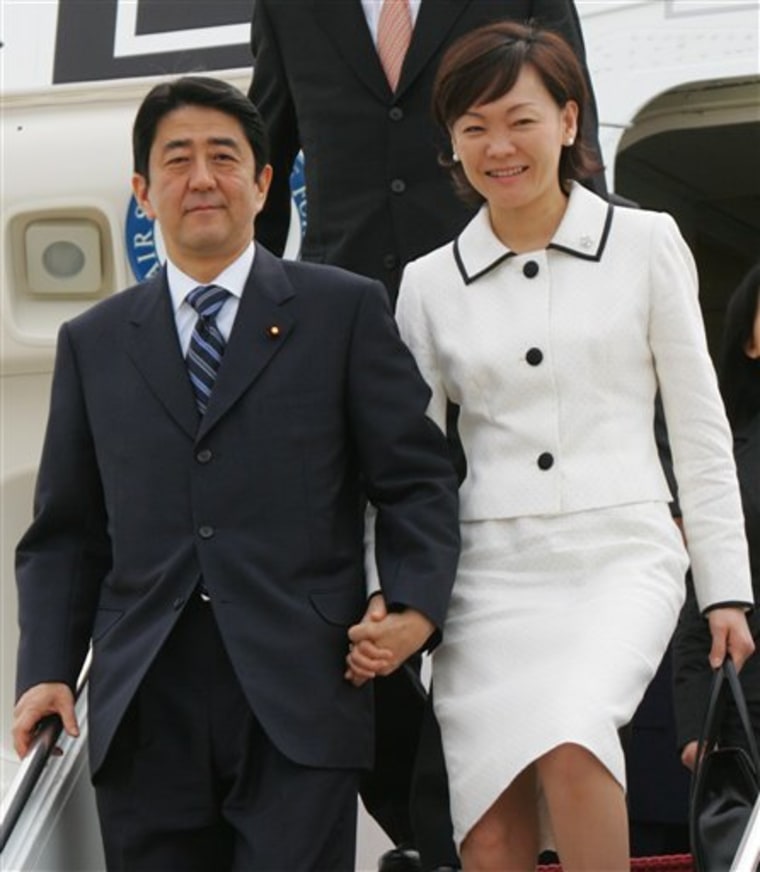Despite some friction between the allies, it was smiles, waves and picture-taking at the White House as President Bush hosted an informal dinner Thursday night for Japan’s prime minister.
Bush and his wife, Laura, walked across Pennsylvania Avenue to call on Shinzo Abe and his wife, Akie, at Blair House, the guest residence for visiting foreign leaders.
The four strolled, four abreast, up the White House driveway for an informal dinner. “Nice day for a walk,” Bush said, although a cloudy sky threatened rain.
The president and prime minister planned talks Friday at the Camp David retreat in Maryland’s Catoctin Mountains.
Overture for an ally
Bush extended that coveted invitation to Abe as a gesture of appreciation of Tokyo’s commitment to the wars in Iraq and Afghanistan. Bush had a close relationship with Abe’s predecessor, Junichiro Koizumi, and wants to build new ties with Abe, despite some tension between the countries.
Japanese conservatives have expressed alarm at what some see as a “soft” U.S. stance on the North Korean nuclear talks. U.S. ranchers and lawmakers are demanding that Japan fully resume importing U.S. beef.
The lunch menu for Friday included cheeseburgers. At the White House, roasted duck was the main course.
Comfort women at issue
Abe’s first U.S. trip as prime minister comes as Congress considers a nonbinding resolution that urges Japan to apologize for its role coercing women to work as “comfort women” for the Japanese military. Abe sought to explain to U.S. lawmakers Thursday a comment he made last month that seemed to minimize Japan’s role in forcing thousands of Asian women into sexual slavery during World War II.
Rep. Roy Blunt, R-Mo., said Abe “expressed regret that his comments were not as he intended for them to be and expressed great sympathy with people who had been placed in that kind of situation.”
People across Asia and the United States, including conservative supporters of Japan in Congress, were infuriated at Abe’s suggestion in March that no proof existed that the military had coerced women into brothels. U.S. officials now say that Abe’s recent public statements supporting the government apology in 1993 have been convincing and that Bush probably would not raise the matter.
Leader face opposition at home
Abe and Bush are eager to convey that the strength of bond that has gained importance as China accumulates economic and military power.
Analysts say both leaders also could seek respite from recent criticism at home.
Abe’s support rating has plunged, with voters angry over scandals involving Cabinet members. Anti-war sentiment is rising among some Japanese. Bush faces an opposition-controlled Congress incensed over his handling of the U.S.-led war in Iraq.
Overall, the U.S.-Japan relationship is strong.
Shared conservative roots
Japan is the largest financial contributor, after the United States, for the rebuilding effort in Iraq, and is the third largest contributor in Afghanistan. Japanese defense forces have conducted refueling operations for the U.S. and coalition forces.
Analysts say Abe’s goal on this trip is avoiding any perception of strain.
“Every Japanese prime minister wants to have, and moreover wants to have the appearance of having, a close relationship with whoever is in the White House,” said Robert Hathaway, director of the Woodrow Wilson Center’s Asia Program.
Abe and Bush got to know each other when Abe was a senior deputy to Koizumi. After Abe became prime minister, he and Bush attended recent economic meetings in Vietnam.
Both men are strong believers in spreading democracy and are the heirs of prominent conservative political families.
Bush is the son of a president and the grandson of a senator; Abe is the son of a foreign minister and the grandson of a prime minister.
At the Vietnam meeting, Abe presented Bush with a photograph showing their grandfathers playing golf with President Eisenhower.
